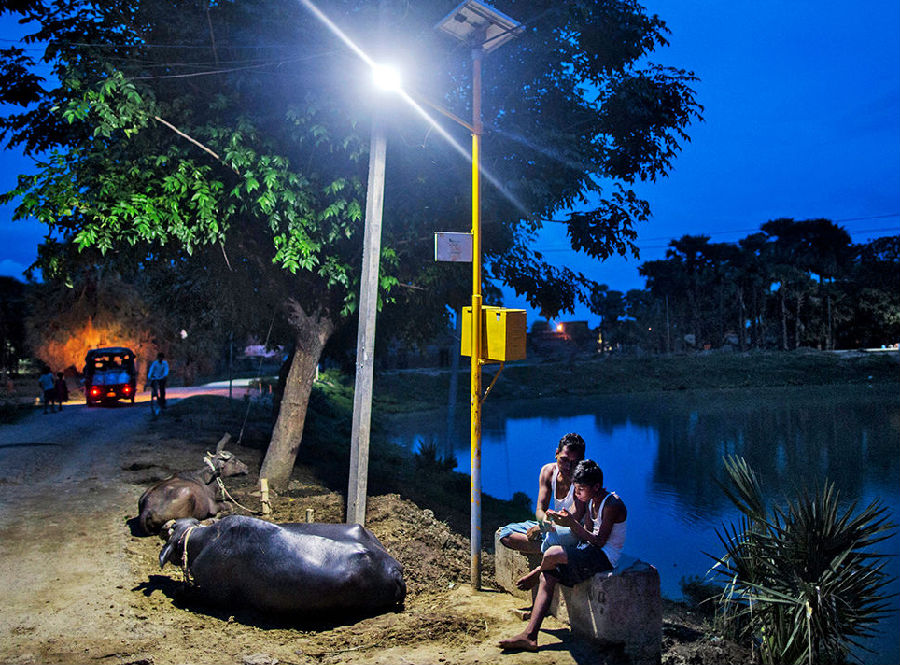A forested village in Jharkhand state, eastern India, Narotoli is home mainly to adherents of Sarna, a nature-worshipping tribal religion.
Narotoli,位于印度东部尔克汗邦的一个草木丛生的村庄,这里居住的大部分都是萨尔纳(崇拜自然的部落宗教)的追随者。
In more ways than one, it has long been off-grid.
他们对自然的崇拜不止一个方面,这个村庄一直都是自给自足的。
Drive past a police checkpoint a few miles away and you are in territory loyal to "the guys", a euphemism for Maoist guerrillas.
开车穿过一个警察检查站几英里远,你就来到了一处忠诚于“那些家伙”的领地。
That makes Narotoli more marginalised than most places.
这使得Narotoli比其他多数地区更加边缘化。
A few months ago it became one of the last in India to benefit from a push by Narendra Modi, the prime minister,
在印度总理纳伦德拉·莫迪的推动下,印度所有村庄都通上了电,
to supply electricity to all the country's villages.
Narotoli在几个月前成为了受益于次举的最后几个村庄之一。
But the power lines are so "reliably unreliable", says an Indian executive, that they might as well be washing lines.
但是一位印度执行官表示,电力线“确实不可靠”,因此这些电力线也可能变成晾衣绳。
Two years before the grid arrived, however, Mlinda, a social enterprise, had set up a "mini-grid",
但是两年前电网运到此处之前,一家社会企业Mlinda已经建起了一种“微电网”,
a bank of batteries charged by solar panels and hooked up to homes, to guarantee round-the-clock power independent of the national network.
通过太阳能板充电并连接到各家各户,以确保全天候电力独立于国家电网。
Mini-grids are different from the rooftop solar panels and batteries (sometimes linked up in "micro-grids")
微电网不同于屋顶的太阳能板和电池(有时在“微电网”中相连接)
increasingly used in poor countries to provide LED lighting and to charge mobile phones.
这种电网在贫穷国家得到广泛应用,为LED电灯和手机提供电力。

Narotoli's 22.5-kilowatt mini-grid provides lighting to scores of homes linked by its poles and wires,
Narotoli的22.5千瓦微电网通过极点和电线为许多家庭提供灯光,
as well as powering a seed-crushing machine for cooking oil,
也为食用油轧碎机、
irrigation in the dry season and power for a poultry farm-all of which engender economic activity.
干旱季节的灌溉以及产生经济活动的家禽饲养所提供电力。
The power generated by the plant is expensive (though it costs less than villagers often pay for alternatives
电厂供电价格昂贵(虽然与村民们常用的煤油照明和柴油机灌溉相比,
such as kerosene for lighting and diesel for irrigation pumps).
这种这种方式的成本较低)。
The worry is that demand for electricity may not be enough to justify the installation cost.
人们的担忧在于,对电力的需求或许不够充足,不足以证明该设备安装成本的优势。
As one Indian official recently scoffed: "Why provide a Ferrari to people who need a bullock cart?"
正如近期一名印度官员笑言:“为什么要给一个需要牛车的人一辆法拉利呢?”
But Mlinda and other mini-grid installers see them as more than a way to satisfy existing demand for electricity: they are a way to catalyse development.
但是Mlinda和其他微电网安装商不仅是将此当做满足现有电力需求的一种方法:更是一种促进发展的方式。
The installers advise villagers on irrigation, farming and marketing to help them develop businesses that require reliable electricity,
安装商在灌溉、农耕和市场方面为村民提供建议帮助他们发展需要可靠电力的商业
which in turn justifies the expense of installation.
而反过来也能使安装成本公平化。
译文由可可原创,仅供学习交流使用,未经许可请勿转载。













